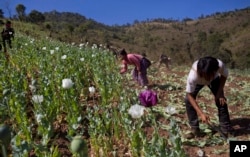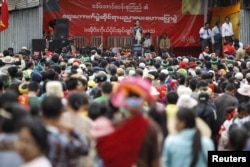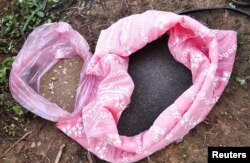The U.N. Office on Drugs and Crime’s latest opium survey for Myanmar and Laos, released Tuesday, said poverty and conflict are the driving forces behind poppy cultivation, the second largest behind that of Afghanistan.
In its latest production assessment, UNDOC said although Southeast Asia’s opium poppy output generally has steadied in recent years, production is still more than triple the output in 2006.
The report found Myanmar’s opium output steady, with 90 percent of production centered in Myanmar, especially in northern Shan state.
What drives production
Jeremy Douglas, UNODC representative for South East Asia, said the reasons that some places persist in growing poppy are clear.
“It’s really driven by economic reasons. It is through the socio-economic surveys not surprisingly found that it’s a higher source of income and poverty – these are the two drivers,” he said.
“Higher source of income where they have no other source of income and poverty. So they are not able to make a legitimate living per se and they have families to support," Douglas explained. " So it’s really pushing people into opium poppy cultivation to make a living for the families.”
In Laos, the report found the area under cultivation was largely in northern Phongsali province at just under 6,000 hectares. Opium poppy output between Myanmar and Laos accounts for 25 percent of global production while the majority is produced in Afghanistan.
Northern Shan State, Myanmar has seen a 14 percent rise in production, amid ongoing fighting between the Shan ethnic forces and Myanmar’s army.
Douglas said the conflict has led to a doubling of production in some areas over the last five years.
The Shan State Progress Party and Shan State Army were both non-signatories to an October 15 ceasefire agreement with eight ethnic armed groups, approved last week by the Myanmar parliament.
Challenges ahead
Douglas said the incoming government with National League for Democracy leader Aung San Suu Kyi is already looking to address issues surrounding opium and heroin trafficking. In September Aung San Suu Kyi travelled to Shan State and spoke of making drug policy a priority.
But challenges remain, especially because the key government agencies overseeing drugs policy in Myanmar remain under the control of the country’s powerful military.
“[Aung San Suu Kyi] will have her challenges and I think that something for the reformers of the government of Myanmar to consider how they would want her to be involved in reform of the police and reform of the parts of government that will actually be in charge of drug control,” said Douglas.
The regional opium and heroin trafficking market, largely geared to demand in China and Hong Kong, is worth some $20 billion.
Douglas said while the U.N. and donor nations look to develop alternative sources of income for opium farmers, new regional drug trafficking challenges have emerged especially methamphetamine type stimulants and other synthetic drugs.







